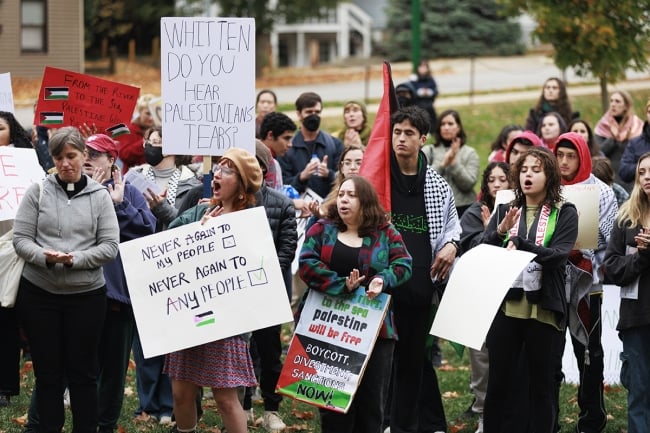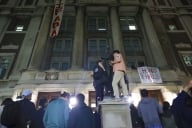You have /5 articles left.
Sign up for a free account or log in.

Protesters at Indiana University at Bloomington demonstrate against Israel’s military actions in the Gaza Strip on Oct. 28, 2023.
Jeremy Hogan/SOPA Images/LightRocket via Getty Images
Some faculty members at Indiana University at Bloomington fear academic freedom on their campus is under attack by a local congressman reacting to claims of antisemitism among some members of the student government association.
The lawmaker, U.S. Representative Jim Banks, a conservative Republican and evangelical Christian who is running for U.S. Senate in 2024, has asked the university’s president to address allegations of antisemitism on campus related to the Israel-Hamas war or potentially risk losing federal funding. He wrote a strongly worded letter to IU’s president, Pamela Whitten, on Nov. 15 implying anti-Jewish and pro-Palestinian activism on campus and imposing a deadline for a response to numerous questions about alleged incidents.
Many faculty members say Banks’s assertions are exaggerated and inaccurate. They say tensions on campus over the war are not disproportionate and not only being experienced by Jewish students but by Palestinian and other Muslim students as well. It’s a highly emotional time in the country, and IU students, like those at campuses across the country, are upset and are holding protests and rallies to express themselves, the faculty members say.
“His letter can only serve to further divide our students, by inhibiting the free expression of ideas—including controversial political ideas—at a time when the exchange of words rather than bullets is sorely needed,” said an open letter from faculty members published online and announced in a press release Nov. 21. It was signed by 220 people as of Nov. 30.
“We are alarmed by the threatening tone of [Banks’s] letter, the way in which it injects ideology into the proper governance of the university, and the way it conflates academic leadership with the policing of controversial ideas,” the letter said. “We understand that antisemitism is a form of hate that has no place in a diverse and inclusive university. We feel the same way about all forms of bigotry, including anti-Arab and Islamophobic discrimination and hostility.”
Since the Israel-Hamas war began in early October, reports of antisemitism and Islamophobia in the United States have increased significantly, according to the Anti-Defamation League and the Council on American-Islamic Relations.
And in some of instances, the incidents have turned violent. A professor at Moorpark College in California was suspended and charged with involuntary manslaughter and battery after a Jewish protester died of injuries sustained during an off-campus Israel-Palestine demonstration. And three college students of Palestinian descent were shot in Burlington, Vt., on Nov. 25.
Student Government Resignations
Banks said his request for an investigation was prompted by the resignations of two members of the IU student government, who accused the student body president of antisemitism in a Nov. 13 letter addressed to the student body. Banks sent his letter to Whitten two days later.
Makiah Pickett, who was the student government’s president and co-director of diversity, equity and inclusion, said in a joint resignation letter with Alex Kaswan, who was the treasurer, that the student body president used “blatantly antisemitic” rhetoric, “intentionally neglecting the experience of Jewish students on campus.”
“Leadership has plainly chosen to ignore the experience of being Jewish on a college campus. I cannot continue to stand by and watch while my concerns and the concerns of other Jewish students are ignored,” Kaswan wrote.
In a response letter posted Nov. 15 on the IU student government’s Instagram page, Aaliyah Raji, the student government president, wrote, “I’m aware of my own biases and those allegations do not align with my experiences or my intentions.”
She identified herself as a Black Muslim woman and added, “The criticisms and claims against me are, unfortunately, an attack based on intersecting identities, echoing a historical pattern of undue criticism faced by Black women in positions of power.”
Banks, who founded Congress’s so-called anti-woke caucus, sent the letter to Whitten expressing support for the student government officers who resigned, singling out pro-Palestinian activism on the campus and threatening the loss of federal funding if the university doesn’t address alleged antisemitism on campus.
“As an IU graduate, allegations of antisemitism at my alma mater are personal and extremely concerning to me. As a lawmaker, I would note that Title VI of the Civil Rights Act prohibits anti-Jewish and antisemitic discrimination,” wrote Banks, who represents Indiana’s third congressional district. “If IU administrators condone or tolerate campus antisemitism, the university could lose access to federal funding.”
Under Title VI of the Civil Rights Act of 1964, colleges and universities receiving federal money are required to protect students from discrimination based on race, color or national origin, which includes Jews, Muslims and other ethnic or religious groups with “shared ancestry.”
But individual lawmakers don’t have the final say on whether a college has violated the law. Instead, the U.S. Department of Education’s Office for Civil Rights has the authority to strip a college’s Title VI funding—but doing so would be an unprecedented move that would first require a lengthy investigation. The OCR has already opened multiple investigations into reports of antisemitism and anti-Muslim harassment on campuses, but if past is prologue, those are more likely to result in a settlement or resolution instead of funding cuts.
Nonetheless, Banks’s letter asked six specific questions and requests the president provide answers by Dec. 1. He asked how many antisemitic incidents on IU campuses have been reported since the war started and if IU received any reports of harassment or illegal activity after two campus protests in October, among other questions about the activities of the IU Antisemitism Advisory Board.
“We appreciate the Congressman’s outreach,” Barbara Brosher, an IU spokesperson, said in an email last week. “The safety and overall well-being of our students will always be our top priority. IU’s commitment to stand against antisemitism is deep and sincere.”
She outlined several safety measures the university has put in place.
“In addition to increasing police patrols across each of our campuses and introducing additional security measures, we are working closely with law enforcement and a variety of Jewish campus organizations to ensure we are following best practices for supporting Jewish students on campus,” Brosher wrote. “Hate has no home at IU and acts of antisemitism and Islamophobia will not be tolerated.”
Jonathan Coffington, another IU spokesperson, said in an email Nov. 30 that the university does plan to respond to Banks’s letter, but he did not say when.
The tensions on campus have been exacerbated by pushback Whitten received for her initial statement about the war, which mentioned “the Middle East” but no specific nations or groups of people.
Whitten released a second statement after pressure from some students, alumni and others, including Ethan Fine, a student and president of the Indiana Israel Public Affairs Committee. Fine authored a petition calling on Whitten to “stand with Israel and Jewish students.”
“I have reflected on the events of this past week and have had many conversations with the IU community,” Whitten’s updated statement said. “I continue to be heartbroken by the terrorist attack on the people of Israel. Let there be no ambiguity, Israel has suffered grievous atrocities at the hands of Hamas terrorists.”
But more backlash ensued. A faculty-led petition with more than 2,000 signatures called for Whitten to “not discriminate in her empathy” and to acknowledge the violence Palestinians have also experienced as a result of the war. Whitten never responded, according to Jeffrey Isaac, a professor of political science at IU.
Isaac, who is Jewish but supported the calls for Whitten to acknowledge Palestinian suffering and deaths, said he was “horrified” to read Banks’s letter and co-authored the open faculty letter in response.
“He’s just using this very opportunistically,” Isaac said of Banks’s letter. “We’re concerned that the administration is going to respond in an incredibly hypersensitive and unfair way to certain kinds of advocacy on this campus on the grounds that they’re threatening the Jewish students.”
‘Danger to Academic Freedom’
Isaac believes the reports of antisemitism on campus are overblown.
“I understand what antisemitism is. I pay attention to what’s going on,” he said. “I don’t need Jim Banks to come protect us. I think this is being exaggerated, and it’s a danger to academic freedom and civil liberties more generally.”
Isaac also published an opinion piece in The Nation last week characterizing Banks’s attempt to put “pressure on Indiana University to police antisemitism” as “duplicitous and dangerous.” In response, Banks posted on X that “Radical Marxist professor Jeffrey C. Isaac is attacking me for standing with Jewish student victims of antisemitism at IU. I’m not sorry!” He added that if anyone reading the post is “also a communist,” they could buy Isaac’s latest book, and he posted a picture of the cover of an edition of The Communist Manifesto, for which Isaac authored the foreword.
Banks also spoke to Fox News about the faculty pushback to his directive for IU.
“These professors are proving my original point. Nowhere in their response do they address my main concern in the letter: IU student leaders feel antisemitism on campus is being ignored,” Banks told Fox News Digital on Wednesday. “When students speak out, it is unacceptable to dismiss their concerns because it doesn’t align with woke political views. IU has a duty to ensure every student feels safe on campus, and I have full confidence in President Whitten’s commitment to that duty.”
Campus Protests
In his letter to Whitten, Banks mentioned two campus protests the student newspaper covered and characterized them as divisive.
A protest organized by two Jewish student groups and a counterprotest organized by the Palestine Solidarity Committee were both held on Oct. 9. Banks described how, according to the student newspaper, the protests devolved into students from opposing sides yelling at each other. He also noted that “just two days after Hamas’s mass murder of 1,300 across Israel,” an attendee at the Palestine Solidarity Committee’s rally claimed they were there to support “our brothers and sisters being mass-murdered, tortured, killed and raped in Israel.”
The Palestine Solidarity Committee organized another rally on Oct. 28 calling for a ceasefire in Gaza and were joined by Jewish Voice for Peace. Banks referenced reports that a protester at that rally held a sign that said “Colonialism, Apartheid, Genecide [sic]” and another who called Israelis “occupiers,” which Banks said “smeared Israelis.”
But Aidan Khamis, a Palestinian student and member of the Palestine Solidarity Committee, said he attended both protests and there was “nothing hateful” about them.
“For Banks to write this off as antisemitism, he clearly doesn’t recognize what’s going on,” Khamis said, noting that criticisms of Israel don’t automatically equate to antisemitism, as Banks suggested. Khamis said he is glad faculty members are speaking out against Banks’s letter.
“This is deeply injected with a political fervor,” Khamis said. “It’s a threat to freedom of speech on campus.”
Benjamin Robinson, an associate professor at IU who co-signed the faculty rebuttal to Banks’s letter, was also at the Oct. 28 campus protest.
“I was there as a self-identified Jew,” said Robinson, who noted that about 300 people of varying faiths attended the peaceful protest. “Banks has zero interest in the facts. On the contrary, his interest is in spinning the facts without knowledge of them. It’s not only ignorance, it’s malice.”
Banks wrote in an email that “If certain professors disagree with my views on Hamas and the October 7th terrorist attack, that’s their right, but my letter is about members of the IU student government resigning after witnessing antisemitism.
“It’s unacceptable to dismiss either their specific concerns or the rise in antisemitic hate on college campuses generally. IU has a duty to combat antisemitism and I have confidence they will. I look forward to hearing from them soon.”
Banks’s supporters have also mounted a response to some faculty members’ assertions that the congressman is attacking academic freedom.
“What unifies us is the strong belief that Rep. Banks’ letter was not only laudable but necessary, and that his detractors’ arguments are greatly misleading,” reads an online petition posted by the Jewish American Affairs Committee of Indiana that had more than 1,000 signatures as of Dec. 3. “We are absolutely supportive of free speech on campus, but what is occurring across the US is that campus administrators are using First Amendment arguments to avoid enforcing policies that they, as institutional leaders, are obligated to fulfill.”
The petition also dismissed the faculty letter’s concern that Banks did not ask Whitten to also ensure the protection against other forms of bigotry, including Islamophobia and anti-Arab discrimination.
It “simply demonstrates that the professors were not genuine in their professed concern about the welfare of Jewish students at IU,” the petition said. “Not only is there no documented spike in anti-Muslim behavior at IU or college campuses in general, but many of the perpetrators of anti-Jewish behavior on college campuses are themselves Muslim.”
Another Side of the Story
In fact, Palestinians and people who support them also say they've been the targets of discrimination and harassment on IU’s campus.
In September, a Jewish student posted a controversial and now-deleted video on TikTok recounting how her neighbor knocked on her door to introduce himself. She later learned the man was Palestinian and said “she would not have opened the door if she knew the man was Palestinian.” She also said “the man probably wants to kill her,” and that she had pepper spray ready if she encountered him again, according to Indiana Public Media.
The IU Middle Eastern Student Association, or MESA, responded by calling on the university to ensure the safety of Palestinian students on campus.
"Threatening someone publicly with violence due to their ethnicity is a hate crime. No student at this university should think this conduct is acceptable. The Palestinian student is, at his core, a member of our IU community. He deserves respect, safety and dignity like everyone else," the organization said.
And in November, the university opened three separate investigations into Abdulkader Sinno, a tenured political science professor and faculty adviser of the Palestine Solidarity Committee, according to Sinno. An IU spokesperson said the university could not discuss personnel matters.
According to Sinno, the first investigation was launched after he made critical remarks of Whitten’s exclusive support of Israelis—and not Palestinians—during a campus event. The other two investigations were started after Banks sent the letter to Whitten.
Sinno said he had reserved a room in early November for an event, which the Palestine Solidarity Committee organized and he co-sponsored. The group had invited Miko Peled, an Israeli American activist and author who advocates for the creation of one democratic state with equal rights for Israelis and Palestinians.
“I was co-sponsoring the event because I thought it had academic value,” said Sinno, who is an expert on Middle East politics. “As professors, we have something called academic freedom. We can decide if something has academic value and sponsor it. The extent of my sponsorship was to reserve that room for the event, which was initiated by the students.”
The event was planned for Nov. 16, a day after Banks sent the letter to Whitten. Sinno said he got a phone call on the evening of Nov. 15 from his department chair telling him to cancel the room reservation because he’d allegedly violated university policy by listing the department as the event sponsor. The Palestine Solidarity Committee attempted to rebook the room and, despite more pushback from the university, held the event as planned.
Sinno received a notice of formal conduct violation the same day.
“A department must have the freedom to determine which events and speakers it chooses to sponsor. Arrogating that privilege for one’s own convenience is simply selfish and uncollegial,” Nick Cullather, interim dean of the Hamilton Lugar School of Global and International Studies at IU, wrote in a letter to Sinno. “Further, violating university procedures by falsifying a form is actionable, with consequences that could affect your career.”
Sinno said he’s booked rooms for campus events at least 20 times without any questions raised—until after Banks’s letter insinuated that the Palestine Solidarity Committee was sowing discord on campus.
“There is no more direct effect than having members of the administration trying to chill academic freedom at IU,” Sinno said of Banks’s letter. “Academic freedom is what makes a university. The moment this is gone, there’s no more university to speak of.”
Banks isn’t the only politician inserting himself into campus-level discourse over the Hamas-Israel war. Florida governor Ron DeSantis, who is a U.S. presidential candidate, consulted with the chancellor of his state’s public university system in October to determine how to deactivate chapters of Students for Justice in Palestine on some campuses.
“Powerful outsiders are attempting to control what can be said on campus,” Irene Mulvey, president of the American Association of University Professors, said. “Whether they’re banning critical race theory or saying these attacks are antisemitic or Islamophobic, the bottom line is that they’re trying to use their power and influence to not allow politically controversial speech on campus.”
She said Banks’s letter is no exception. It’s “an obvious attempt to use the power of his office and the threat of funding cuts to control what political views are allowed to be said or expressed on campus.”
Protecting academic freedom in a democracy always requires “constant vigilance,” but especially “during polarizing times like these, we see the attacks escalate and proliferate,” Mulvey said. If IU doesn’t “protect academic freedom now, then any commitments they have to protecting academic freedom are meaningless.”
(Note: This article was revised to remove a reference to an Indiana University student who was expelled for attacking a Muslim women and charged with intimidation, strangulation and battery. The incident occurred in 2015, not in 2023.)








